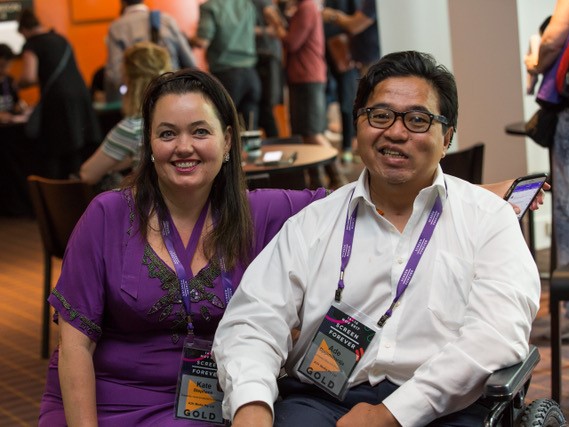It’s all too easy to just make assumptions about the numbers of people with disabilities who work in the screen industry – and what they think about their workplace – because very little well-researched data exists.
A newly-launched survey by the University of Melbourne is setting out to change that, bringing research grunt to a ground-breaking project from A2K Media that aims to get more people with disabilities into the sector, and change attitudes and hiring practices.
The survey asks questions about how (or if) people disclose their disabilities, feelings towards disability in the workplace, and considers the main challenges to participation – insufficient funds, mentoring, awareness, infrastructure, hours of work, etc.
It canvasses possible solutions including Disability Action Plans for all productions, access as a budget line, mentoring training and quotas.
A2K co-founder and producer Ade Djajamihardja says the survey is vital.
“One in five people in Australia experience disability. It’s time to bring the issues which put up barriers for these people in the screen industry to the fore.
“We know that simply telling people the facts and figures or highlighting relevant legislation doesn’t change behaviour. But framing a message with personal stories can.
“This survey is about hearing those stories – from both people with and without disability. We want to hear from everyone that works in any role in the Screen industry. Anyone can become Disabled at any time. Let’s make the industry inclusive and welcoming for everyone.
“I implore you. Please fill in this survey and give us your honest views. The answers will be totally anonymous, so this gives everyone in the screen industry an opportunity to share any thoughts or concerns.”
The survey will inform A2K’s larger ambitions to deliver an online education platform, built by e-learning specialists Savv-e, that is aimed at informing and educating the industry about issues which have prevented people with disabilities getting work in the past.
“A ‘human face’ with some light-hearted comedy does more than soften the message, it makes it memorable and allows us to reflect on our own attitudes. Peer-to-peer dialogue and meaningful exchange with current industry professionals who have lived experience of disability provides the key to an authentic, safe and honest discussion that as yet, has not been heard by the mainstream,” says Djajamihardja.
“We are proposing a seismic cultural shift in our industry so we can involve all potential contributors and collaborators.
“As such, it requires grassroots sensitivity training to create the impetus needed to evolve and change old mindsets.
“This disability equity and inclusion training presents an opportunity for a much-needed paradigm shift, by going behind-the-scenes and digging deeper to challenge the status quo that currently exists across the screen sector. This is an industry-specific, disability-led ‘how to guide’ for genuine inclusion.”
Beyond the course, A2K plans to build an online community via its Disability Justice Lens (DJL) project, alongside a crewing database.
Djajamihardja had a successful media career until he suffered a massive stroke in 2011. He struggled to rejoin to the industry and now wants to make it easier for those in a similar position.
He co-founded A2K Media with his partner Kate Stephens and has produced two series Tales from the Crips and The Wheelhouse, a live performance comedy show from the 2021 Melbourne International Comedy Festival. They will be screened on SBS this year.
Both productions featured a team of disabled and non-disabled cast and crew – blending emerging talent with experience.
“Our goal is to not only create exciting media products and tell great stories that enlighten and inspire and entertain, but to also do this in the most holistic inclusive way possible, and all the while respecting people’s access requirements and wellbeing and providing cultural safety.”
Ade Djajamihardja says victory for this project would see employers, employees, and potential co-collaborators (both disabled and non-disabled) all firmly believe that they are working with an open and “level playing field” for both empowerment and opportunity.
The project’s major partner is Screen Australia (as a recipient of the Screen Australia Enterprise Business & Ideas funding). Film Victoria is the major film state funding body and other support from Screen NSW, Screen Queensland, South Australian Film Corporation and Screenwest. Independence Australia, The University of Melbourne, through the Melbourne Disability Institute and AFTRS are also backing the project.
The survey is now open until 21 March.
Denise Eriksen is co-founder of Media Mentors Australia, consulting to A2K on the DJL project. She also worked with Ade Djajamihardja back in his earlier days at the ABC.


